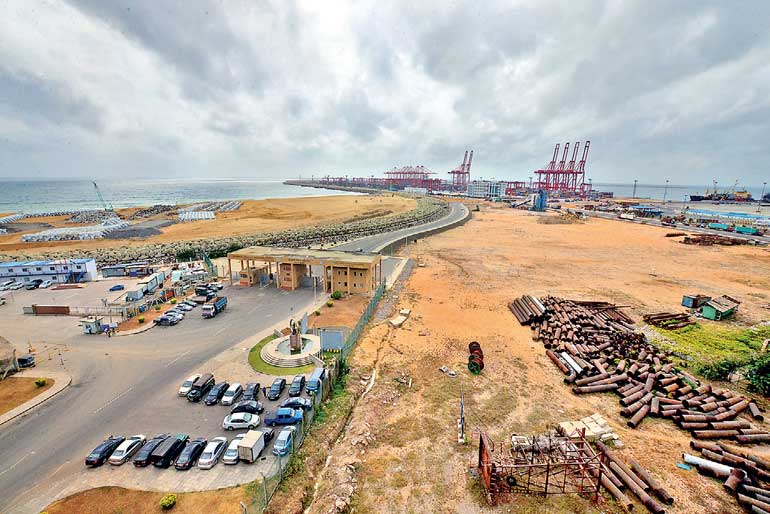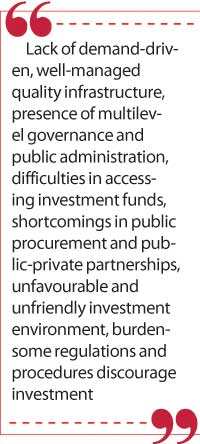Monday Feb 16, 2026
Monday Feb 16, 2026
Saturday, 26 June 2021 00:02 - - {{hitsCtrl.values.hits}}

Sri Lanka is notorious for making changes in its policies, programs, decisions, actions and attitudes. Sri Lanka did not have a consistent economic policy since independence. With a change of government, the policy pendulum moves from one extreme to the other – Pic by Shehan Gunasekara
By Chandrasena Maliyadde
Investment is a sacrifice, which involves taking risks. This means that businesses, entrepreneurs, and capital owners will require a return on their investment to cover this risk and earn a reward. In terms of the whole economy, the amount of business profits is an indication of the potential reward for investment. Investment and reward for investment are determined by the interaction of prospects and challenges.
As we saw (‘Boosting investment in Sri Lanka: Part 1 – Prospects’), Sri Lanka is a country blessed by a host of natural and man-made factors supportive and conducive for investment promotion. This is particularly significant compared to our neighbours. But, the investor faces challenges of varying nature discouraging investment.
Ease of Doing Business
The ‘Ease of Doing Business Index’ initiated by World Bank measures and tracks changes in regulations affecting the lifecycle of a business across 190 economies and is the global benchmark for measuring a country’s capacity to attract investment.
The highest-ranked five countries are New Zealand – 1, Singapore – 2, Hong Kong – 3, Denmark – 4, and South Korea – 5. Sri Lanka is ranked 99 and behind India (63), Bhutan (89) and Nepal (94). Interestingly, Sri Lanka gained independence from the British in 1948. Vietnam was liberated from Americans 27 years after in 1975. Sri Lanka liberalised the economy in 1978. Vietnam is ranked as 70 in the Ease of Doing Business index. Sri Lanka is staggering at $ 758 million, while Vietnam has attracted $ 16,120 million of Foreign Direct Investment (FDI).
The delays, inefficiency, corruption, excessive documentation, bureaucratic lethargy, lengthy procedures in the initial approval process are major challenges for investors. Such lethargic, time-consuming approaches discourage and distract investment.
Frequent changes
Sri Lanka is notorious for making changes in its policies, programs, decisions, actions and attitudes. Sri Lanka did not have a consistent economic policy since independence. With a change of government, the policy pendulum moves from one extreme to the other. Before 1977 the country maintained a protective economic policy regime. After the change of Government, we went to the other extreme, total liberalisation. Economic outlook changes with a change of ruling party and even with the change of Head within the same party.
India prepares a Development Plan for every five years. The investor would know beforehand what opportunities are available and what restrictions would come. A change of Government would not change the basic policy. Take recent elections in the US. Trump and Biden are in utter contrast. But the US has not changed its economic policy or its international relations after Biden was elected. There would be changes in the approach but not the policy.
The Government invited the private sector to invest in facilities for higher education. SAITM is one such investment made to provide medical education. The Government, Ministry and officials have been shifting their stance all the time. What happened thereafter is history.
Political stance is no different. We have changed the Constitution 20 times within 40 years. The 19th Amendment and 20th Amendment stand on two opposite extremes. Inconsistency in policy, outlook and attitude confuses investors and adds to their risk.
 Lack of transparency
Lack of transparency
Decisions and actions are ad hoc, momentarily and lack transparency. Consider how we acted and reacted in the case of East Terminal. There was a tripartite agreement signed with Japan and India on the operation of ECT. The investors from three countries had been identified and agreed. TUs and the clergy raised objections. The Government heeded to and shelved the agreement unilaterally. India and Japan were taken by surprise. In addition to abstinence in the voting in Geneva, Sri Lanka lost investor confidence.
To make matters worse, Sri Lanka offered the West Terminal as the Sinhala adage goes ‘showing the younger sister and giving the elder one in marriage’. Business of this nature needs consultation, negotiations and professionalism which we lack.
Some decisions and actions annoy the investors, making them protest, take legal action, and go behind and bribe politicians and officials, wasting their time and money.
Absence of coordination
There is a plethora of facilitating agencies, research organisations, extension arms, and implementation agencies. They work in tandem and isolation. Take rubber cultivation. Many actors are operating vertically. Rubber Development Department, Rubber Research Board, rubber plantation companies, smallholders, rubber product manufacturers are some. Then there are agencies operating horizontally. Universities, EDB, BOI, agencies responsible for other crops, land-owning agencies and traders. Officials of these agencies get together for a drink or to discuss their grievances but, hardly spend time on cross-cutting issues and complementarities in the sector.
The research output, technology and knowledge are not transmitted to the field. The planter, smallholder, processor and the buyer carry on their work as a habit and a practice. Hardly think of improving the productivity, cost efficiency, earnings, or quality resulting in rubber remaining uneconomical. The same scenario goes with other crops and products.
Absence of coordination among facilitating agencies harms and hurts investors. They have to go from pillar to post incurring extra cost and wasting time. The so-called value chain is dismantled and fragmented. Pre-harvest operators do not know what is going on with post-harvest operators. Agencies such as BOI, EDB, SLTDA and IDB were set up for coordination. But they lack command; there is a communication gap. Over the years other ministries have passed legislation diluting the powers vested within these agencies without their knowledge.
Then Secretary to the Treasury Dr. P.B. Jayasundera publicly stated that BOI suffers from inadequate professionalism and inadequate performance. In terms of promoting Foreign Direct Investments, the Government has focused upon an information desk, a one-stop shop to provide all necessary services under one roof, and a monitoring department to supervise the progress of projects. These are yet to see the light of the day.
Changing world economic order daily with globalisation and the awakening of new regions has intensified the competition for FDI among developing nations. The BOI has to be more vigilant, attentive, proactive and aggressive. They go out to canvass and conduct roadshows, promotional campaigns, fairs and exhibitions on foreign land. BOI knows a lot about potential investors in the world but a little about potential investment opportunities available in the country.
Kithmina Hewage, Research Economist of IPS in his contribution to Talking Economics, IPS in November 2015, on ‘Doing Business in Sri Lanka: Investment Climate and Challenges Ahead’ had this to say: “However, Sri Lanka appears to perform worst in areas that require institutional coordination. These inefficiencies, in turn, appear to create bottlenecks in the creation of new businesses while restricting their growth."
Too much nationalism and patriotism (isms)
We are a nation happy and proud to live in history. We love to cite, recall and repeat history. All political parties exploit these “patriotic feelings”. Sinhala Only, undivided country, united nation, territorial integrity, unitary status, war victory are patriotic slogans used in elections. These slogans and some actions are insensitive, they harm and hurt relationships among communities within the country and with other countries. That will distract foreign investment.
When an investor comes, we examine his pedigree rather than the impact of his investment. We become rhetoric and love to refer to foreign investment with words such as ‘a part of Indo-Pacific strategy,’ ‘undermine Sri Lanka’s status as a sovereign country,’ ‘a threat to Sri Lanka and its national goals, objectives, sovereignty’ and/or ‘national security,’ ‘colonisation,’ ‘expansionism’.
Our patriotism rises higher when it comes to aid or investment coming from the US, China and India. These three countries have conquered outer space and are competing to colonise, expand and occupy the moon and mars. For them, the moon and mars are more important and strategic than Sri Lanka.
Hanoi is the capital of Vietnam. My good friend, a well-respected career diplomat (not a bag carrier diplomat) while being our envoy to Thailand has visited Hanoi during his tenure. He said he was shocked to see a national war memorial erected in Hanoi surrounded by American investment. Vietnam fought a war against the US and won it and pushed it back to history and is building up the nation with investment coming from its arch enemy.
Misplaced emphasis on infrastructure
We believe that infrastructure would necessarily lead and attract investment. Many economists have cited poor infrastructure facilities as a constraint for investment in the country. This notion of ‘infrastructure-driven investment’ in general terms may be correct. But, the relevance, quality, cost, gestation period, management, and maintenance of infrastructure are equally or more important. We pay more attention to creating infrastructure facilities and pay the least attention to these aspects. These aspects are important and lack of attention to them introduces challenges to investment.
Take Mahiyangana-Kandy (18 bends) road. After rehabilitation a few years ago, it has been more accident and landslide-prone, causing more delays and difficulties and incurring additional cost. Some flyovers erected to ease congestion caused more congestion due to lack of management. Rajagiriya flyover is a case in point. Some flyovers are not functioning due to a lack of maintenance.
Some infrastructure leads to loss of business. The Southern Expressway deprived a host of business opportunities of the informal sector and MSMEs down the old Galle Road. All the tourist resorts are located on old Galle Road. Access from exchange to such resorts winds through bazaars, streets, residential areas and other busy congested patches and takes the same duration or sometimes a longer duration than that taken on old Galle Road.
R.A. De Mel Mawatha is another example. Billboards advertising various products appeared all along the road before the rehabilitation and upgrading, witnessing flourishing business. Same billboards with ‘to let’ and ‘to lease’ appear now indicating loss of business. The newly-constructed shortcut at Ramboda Pass has deprived an exceptionally beautiful breath-taking view and a rare experience for tourists.
Another factor we always oversee is infrastructure-led investment vs. investment-led infrastructure. We place emphasis on the former for reasons known such as image building, prestige, etc. and for reasons unknown, but better known British colonials went for the latter.
The introduction and development of the rail transport network in Sri Lanka provide a classic example of investment-driven infrastructure. Wikipedia reports: “Rail was introduced in Sri Lanka in 1864 to transport coffee from plantations in the hill country district of Kandy to the port city of Colombo… With the development of tea plantations in the 1880s… To send tea to Colombo and to transport labour, machinery, manure, rice and foodstuff, etc. to Kandy, another 100 miles of railways were constructed in the tea planting districts to serve the expanding tea domain. To serve the coconut plantations flourishing in the west, south-west and north-west coastal areas of the country, and the wet inland rubber plantations below the tea belt, railway lines were built in the wake of these agricultural developments.”
Other challenges
The bureaucrat and the investor do not see eye to eye. Our bureaucracy and the systems are not investment-friendly. They are more authoritative than facilitative. They open the book to restrict, discourage and penalise the investor and close it when it comes to facilitation. We lack out of the box and out of the book proactive thinking.
Some investors cannot register inventive and innovative products as they are not mentioned in the regulations. I knew a man who improved the two-wheel tractor replacing the handle with a steering wheel. He could not register it with the Department of Motor traffic as there is no classification found for such vehicles in the law.
Sri Lanka is a tropical country. But thermal energy occupies nearly 60% of total power generation. Opportunities for solar energy are enormous but, not harnessed. An investor wanted to promote highway solarisation and sought a two-kilometre stretch for a pilot project. The country owns a very well spread-out road network of 116,000km but, RDA could not a two-kilometre stretch for the pilot project. That was the end of that investment.
Provision of unnecessary lengthy minute details on trivial aspects of sensitive issues in print and electronic media (not to mention social media) runs against investor promotion. They are harmful and damaging and ruin investment prospects. Remember Brandix COVID cluster? A woman was almost branded as a prostitute and the reputation earned by the Brandix brand in the market was demolished.
Sometimes we overly give attention to macro elements and ignore the micro-level requirements and individual investor needs. We spend colossal sums of money on tourism promotion and infrastructure development. But ignore building a toilet to answer a call of nature. On a visit to Anuradhapura sacred area a few years ago, I inquired from a security officer where the toilet was. He pointed to a tiny hut and warned me that the common practice of all visitors is doing it in the open field.
Government agencies look after their turf referring to age-old outdated ordinances. The Forest Conservation Ordinance was introduced in 1908; Fauna and Flora Protection Ordinance to provide for the protection, conservation and preservation of the fauna and flora and the prevention of the commercial exploitation of such fauna and flora in 1937. They are not sensitive to changes and trends that have taken place in population dispersion, land use patterns, country priorities, economic thinking and many other areas since the time they were enacted.
Public protest, TU actions (too much democracy), interventions, favouritism, discrimination, callous attitudes, imaginary pride, disregarding expert opinion and considering pseudo opinion makers’ views have paused challenges to investment. Climate change, Sustainable Development Goals, environmental and ecological concerns, human-elephant conflict, child labour, gender concerns, human rights have come to the forefront posing new challenges for investors.
We can no longer be deaf and dumb to these challenges; we have to introduce changes to our investment climate and re-strategise investment promotion aligned to these new forms of challenges. They more often than not open up new investment opportunities.
The absence of entrepreneurship is another serious challenge. There is a business community consisting of risk averters, traders, deal makers, brokers, commission agents, casino players. They operate in all scales from micro to international, authentic to unauthentic, and retail to wholesale. Some are family business. While some children run the business, others ruin the business. Some businesses are habitual; some are duplication. Businessmen are simply transferors. A risk-taking inventive innovative entrepreneurial investor community is absent in the country. Sri Lanka lacks managerial skills, entrepreneurial skills, and a disciplined skilled workforce.
In brief, lack of demand-driven, well-managed quality infrastructure, presence of multilevel governance and public administration, difficulties in accessing investment funds, shortcomings in public procurement and public-private partnerships, unfavourable and unfriendly investment environment, burdensome regulations and procedures discourage investment.
I conclude with what Hewage has to say: “Therefore, to mitigate the potential of being ‘left behind’ in domestic and foreign investments by competitors, it is imperative that institutional reforms are immediately initiated in the country.”
Those who promote as well as those who oppose ‘Port City Project’ may bear this in the back of their head, if they have one.
(Chandrasena Maliyadde has served as a Secretary to three Ministries before his retirement. He is currently a Vice President of Sri Lanka Economic Association. He can be reached via [email protected])